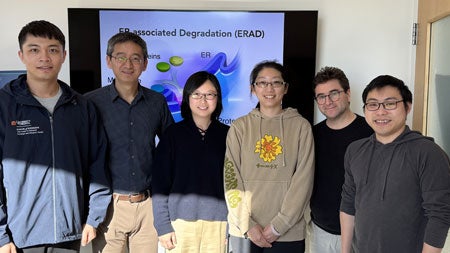
Ling Qi, PhD, (second from left) and Shengyi (Iris) Sun, PhD, (third from left) and their research team.
Ling Qi, PhD, professor and chair of the Department of Molecular Physiology and Biological Physics, and Shengyi (Iris) Sun, PhD, associate professor in the Department of Pharmacology, and their research teams, earned a $3.2 million grant from the National Institute of Neurological Disorders and Stroke (NINDS) to investigate the mechanisms underlying SEL1L-HRD1 ERAD (Endoplasmic Reticulum-Associated Degradation) disease variants. Their project aims to uncover the biological processes that contribute to the development of neurodegenerative and immunological diseases linked to defects in protein degradation in the endoplasmic reticulum.
The research focuses on the SEL1L-HRD1 protein complex, which plays a crucial role in maintaining cellular homeostasis by targeting misfolded proteins for degradation in the endoplasmic reticulum. Recent studies from the Qi and Sun labs have identified four mutations in SEL1L and HRD1 that are associated with a newly recognized disorder, ERAD-associated Neurodevelopmental Disorders with onset in Infancy (ENDI). This disorder has been observed in 11 patients who exhibit severe neurodevelopmental impairments, with symptoms manifesting in infancy. None of the patients are verbal, and some experience locomotor dysfunction. Additionally, a subset of patients presents with B-cell lymphopenia, leading to recurrent infections and early mortality.
The researchers’ groundbreaking findings were published in 2024 in four scientific journals, including two papers in The Journal of Clinical Investigation (JCI), one in JCI Insight, and one in Nature Communications. Their collaborators include a distinguished group of international and national researchers: Drs. Fowzan Alkuraya (Saudi Arabia), Margit Burmeister (University of Michigan), Nicola Brunetti-Pierri (Italy), Karine Poirier and Claude Besmond (France), and Denisa Weis and Johannes Mayr (Austria). Key contributors from the University of Virginia include postdoctoral fellows Drs. Huilun (Helen) Wang and Liangguang (Leo) Lin, research scientist Dr. Mauricio Torres, and MSTP student Jason Li. Their collective efforts have been instrumental in advancing understanding of ERAD-related diseases.
By elucidating how these mutations disrupt cellular function, the research team aims to uncover novel therapeutic targets and develop strategies to mitigate the harmful effects of ENDI. Ultimately, this project has the potential to pave the way for innovative treatments for disorders caused by defective protein degradation, offering hope for patients and families affected by these devastating conditions. This research marks a significant step forward in the quest to understand and combat ERAD-related diseases.
Filed Under: Research
